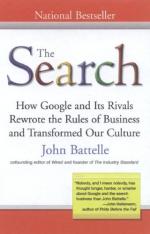|
This section contains 423 words (approx. 2 pages at 400 words per page) |

|
The Search Summary & Study Guide Description
The Search Summary & Study Guide includes comprehensive information and analysis to help you understand the book. This study guide contains the following sections:
This detailed literature summary also contains Topics for Discussion and a Free Quiz on The Search by John Battelle.
Searching the Web is a commonplace activity for those who use the Web. Without the ability to search, the Web would likely be a smaller and less useful place. As Internet businesses grow, the competition to have high rankings in search engines becomes a consulting business in its own right, where Web pages are optimized with SEO (Search Engine Optimization) techniques. This is all driven by the desire to increase a Web site's traffic, which in the Internet business world translates directly into more sales.
Larry Page and Sergey Brin carry out search development centered on a unique approach to ranking pages by relevance. This development leads to creating a search engine and a company called Google. The first few years of Google's life involve further development, but a business plan needs to be created that brings in revenue. The pay-per-click business model that Bill Gross first develops proves to be successful, and Google takes off on a rapid growth path. A somewhat messy IPO period ensues with a good deal of criticism from the press. Meanwhile, other search companies, especially Yahoo, take a different technical approach to search, and their businesses grow. Still, none can match the expansion of Google into the marketplace. Eventually, the Google IPO goes through, and investors make millions of dollars in just a few months.
Search has its downside as well. Information that is normally difficult to research is brought to the Web and added to search indexes. Anything on the Web that is not specifically shut off from search will become part of the indexes. Depending on what information is on the Web, individuals might be shown in a poor light when others do searches on their names. Rectifying this situation now involves lawsuits, although recent legislative efforts might control access to personal information better in the future. The risk is also high that the government might abuse information returned in search results.
The upside is that search brings us more relevant results, and since new devices - not just your computer - may access the Web, search has the potential of making life easier. The author envisions a Database of Intentions, an integral part of determining a searcher's intent while clicking through the Web. Searchers leave click trails that show where they have been and what they have looked for. These can be included in the Database. If the user's intent can be determined, then marketing efforts that follow the user around the Web will have greater chances of generating sales.
Read more from the Study Guide
|
This section contains 423 words (approx. 2 pages at 400 words per page) |

|



